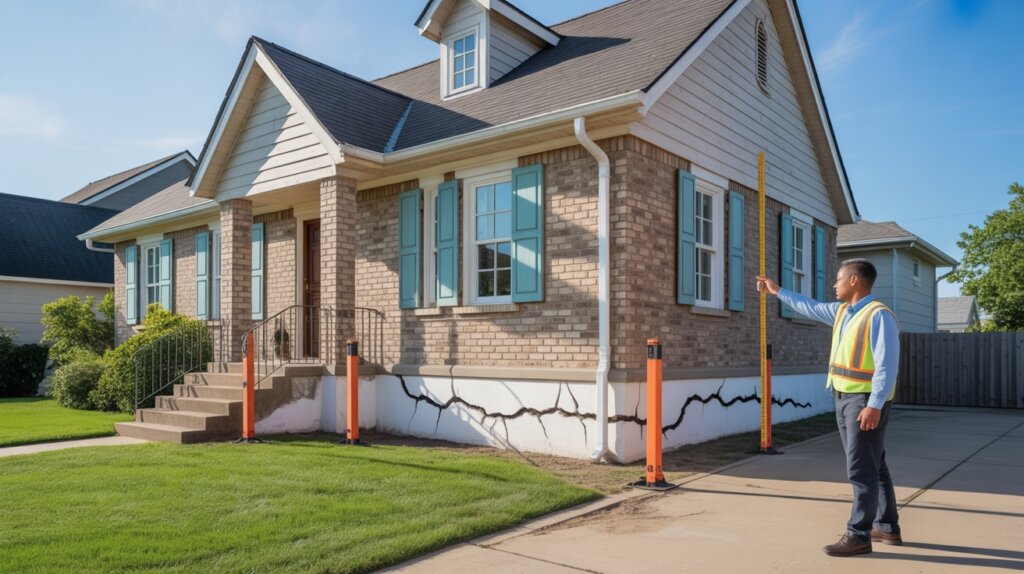Selling a house with foundation problems can feel overwhelming. Many buyers see foundation issues and immediately walk away. This makes it hard to get good offers or even serious interest.
Uncertainty about repair costs or future damage scares buyers. Sellers may worry that the house will sit on the market for months. Some even fear offers will be far below market value. You can market a house with foundation problems by targeting the right buyers and being transparent about the issues.
Highlighting the home’s potential and sharing repair information builds trust. This approach can attract investors or buyers looking for a project. This blog will guide you through every step of selling a house with foundation problems and help you get the best outcome.
Key Takeaways
- Fully disclose all foundation issues with inspection reports, repair estimates, and photos to build buyer trust and reduce legal risks.
- Target real estate investors, cash buyers, and renovators who seek properties with repair potential and value-add opportunities.
- Highlight renovation potential, after-repair value (ARV), and neighborhood amenities to attract buyers focused on long-term equity and ROI.
- Price the property competitively, factoring in repair costs and recent comparable sales, and consider offering repair credits or incentives.
- Use professional staging, high-quality photos, and clear marketing language to showcase the home’s strengths and renovation possibilities.
Understanding the Impact of Foundation Issues on Home Value

Foundation problems lower your home’s market value. Buyers see foundation issues as risky and expensive to fix. This often leads to lower offers or lost interest.
Visible cracks and moisture problems cause safety concerns. Lenders may not approve loans for homes with unresolved foundation damage. Fewer buyers can qualify to purchase your home in this case.
If you get a professional foundation check and fix major issues, you can attract more buyers. Providing repair records or inspection reports helps build trust. These steps may help your home sell faster and at a better price.
Additionally, addressing foundation issues can unlock equity that has appreciated in your property. Avoiding unnecessary repairs and understanding the home valuation process can further enhance your chances of a successful sale.
Identifying Your Ideal Buyer
To sell a house with foundation problems, you need to strategically focus on buyers who recognize value in properties needing repairs. Target real estate investors, fixer-upper enthusiasts, and cash home buyers, as they assess risk differently than traditional buyers.
Tailor your marketing approach to highlight the possible returns and renovation opportunities these groups seek. Additionally, understanding the property’s market worth through proper evaluation can help you set realistic expectations and attract the right buyers.
Targeting Real Estate Investors
Real estate investors often see homes with foundation issues as smart investment opportunities. These properties can gain value after repairs, which attracts buyers looking for profit. If you highlight the potential increase in value, you will draw more investor interest.
You should provide detailed foundation repair reports and clear contractor estimates. Investors need this information to calculate repair costs and returns. If you offer transparent data, you make it easier for investors to make decisions.
Listings should use terms like after-repair value (ARV) and cost-benefit analysis. These phrases show buyers you understand their needs. If you present honest investment scenarios, you will attract serious investors quickly.
Clear documentation and realistic numbers speed up negotiations. If you target investors, you can reduce the time your property is on the market. This approach also increases your property’s appeal in a competitive market.
Appealing to Fixer-Upper Buyers
Many buyers look for homes they can fix up. If you market your property as a fixer-upper, you reach these buyers directly. This can increase your chances of getting offers.
Homebuyers who want fixer-uppers expect honest information. You should share any structural reports and discuss foundation stability clearly. If there are repairs needed, mention them in the listing.
Inspection reports with repair estimates help buyers understand the work involved. You can also include possible value increases after renovations. Technical terms can show you know the property’s real condition.
Highlight the opportunity for buyers to customize the home. They can imagine making upgrades that fit their tastes. This approach attracts people who see potential, not just problems.
Reaching Cash Home Buyers
Cash home buyers are a good option for properties with foundation issues. These buyers do not rely on traditional loans. They can handle repairs and buy quickly if the deal is right.
Most cash buyers are investors or contractors. They look for homes with renovation potential. If you provide reports on soil and structure, it can build trust.
Listing details should focus on the property’s strengths. You could mention available soil analysis or open crawl spaces. If buyers see these details, they may move faster with their decisions.
Getting a Professional Foundation Inspection
You need to hire a licensed structural engineer to conduct a comprehensive foundation inspection before listing your property. Carefully review the inspection report so you can accurately communicate issues and solutions to potential buyers. Use the engineer’s findings to obtain precise repair estimates, strengthening your negotiation position and pricing strategy.
Additionally, understanding market conditions can help you time your listing effectively and set realistic expectations for buyers. Being aware of property valuation trends can also guide you in pricing your home competitively in the current market.
Choosing Qualified Structural Engineers
A qualified structural engineer should always inspect your home’s foundation. Only a licensed engineer can provide an unbiased, expert opinion. If you want accurate results, do not use general contractors or foundation repair companies.
A good engineer will understand your area’s soil and building methods. Look for someone with experience in diagnosing residential foundation issues. If you choose the right expert, you will get a clear and honest report.
The best engineers give detailed reports with photos and simple language. They make objective repair recommendations and do not promote specific contractors. If you need to meet local rules, select someone who knows your area’s codes.
Hiring a skilled engineer helps you sell your home with confidence. If buyers trust the inspection, they are more likely to make an offer. Proper documentation also makes the selling process smoother.
Interpreting Inspection Reports
When you get a foundation inspection report, read it carefully to understand the main findings. Make sure the report clearly explains what type of problems exist and where they are located. If the report is unclear, ask the engineer for more details.
Look for reasons behind the problems, such as shifting soil or water leaks. If these causes are listed, you can plan the next steps more easily. Knowing the difference between cosmetic and serious issues helps you explain the report to buyers.
If you share this information openly, buyers will see you as honest and prepared. Use the report to answer questions and support your price in negotiations. A clear report builds trust and can make the sale process smoother.
Estimating Repair Costs
To estimate repair costs for a house with foundation problems, start with a professional inspection. A certified structural engineer or foundation specialist should do this inspection. Their report gives an accurate idea of needed repairs and costs.
The inspection looks at slab cracks, settling, and water damage. It also lists recommended repair methods. Cost estimates are provided for each repair.
If you have clear repair costs, you can set a fair asking price. Buyers may trust your information and negotiate honestly. Accurate estimates make your property more appealing, even with foundation issues.
Disclosing Foundation Problems Honestly
Full disclosure about foundation problems is important when selling a home. Most states require sellers to share these issues by law. If you hide information, you risk legal trouble.
Honest communication builds trust with buyers. It also lowers the chance of problems after the sale. Buyers who know about issues are more likely to be serious about purchasing.
Sellers should list all known foundation problems in writing. If you document issues, you show responsibility and avoid accusations of hiding defects. Proper disclosure also helps you follow state property laws.
If you are open about repairs needed, you may attract buyers ready to handle them. This can make negotiations smoother. Clear information gives you an advantage when selling your home.
Understanding the closing costs for sellers involved in the sale, such as real estate commissions, title insurance, transfer taxes, and property taxes, can help you better prepare for the process. Additionally, being aware of title issues can prevent surprises during the closing process.
Gathering Repair Estimates and Expert Opinions

You should get professional repair estimates and expert opinions after disclosing foundation issues. These documents help buyers understand the problem and possible solutions. If you provide clear information, buyers may feel more confident about the home.
Additionally, including a thorough property lien search can assure buyers that there are no hidden legal obstacles affecting the sale. Licensed structural engineers or trusted contractors can inspect the damage. They will suggest repair methods and give written estimates with costs and timelines. If you have these reports ready, you show you are serious about fixing the issue.
You can include engineer’s reports, contractor estimates, and visual evidence in your documents. Providing detailed documentation can also help expedite the probate sale process by demonstrating transparency and preparedness. If you give information about repair loans, buyers can see their options. This approach helps reduce doubts and can make negotiations easier.
Highlighting Other Attractive Features of the Property
Attractive features can help buyers overlook foundation problems. A well-kept garden or outdoor area adds strong curb appeal. Mature trees or colorful plants make the property more inviting. Additionally, highlighting market analysis insights can help position your property competitively despite foundation issues.
Inside, updated decor and modern appliances improve comfort and style. If the home has an open layout or lots of natural light, highlight these. Quality fixtures and finishes can increase buyer interest. Professional staging shows off the best parts of your home. High-quality photos help capture these features for listings. Marketing materials should focus on these strengths to attract buyers.
Pricing the Home Competitively

You need to assess your home’s market value with a critical eye, taking foundation issues into account. Analyze recent sales of comparable properties and consult with real estate professionals to establish a realistic baseline. Adjust your price strategically to attract serious buyers while reflecting the true condition of the property. Considering step-up in basis can help ensure you set an appropriate and competitive price.
Assessing Market Value
You determine a competitive price by considering repair costs and buyer opinion. Start with a professional foundation inspection. Use this report to understand the extent and cost of repairs.
Compare your home to others recently sold in your area. Look at both homes with and without foundation issues. If similar homes sold for less due to damage, price yours accordingly.
Buyers may notice cracks and worry about future problems. Appraisers often lower values for structural concerns. Investors might only offer low prices if repairs are expensive.
Adjusting Price Strategically
Setting the right price helps your home stand out, even if it has foundation issues. If you price your house well, you can attract more buyers. Always adjust the price based on repair costs and a smaller buyer pool.
Sellers should check the prices of similar homes in the area. Use quotes from trusted contractors to estimate repair costs. If you want to encourage buyers, consider including a little extra as an incentive.
Clear pricing shows buyers you understand the market. If you are open about repairs, you can build trust with potential buyers. Honest marketing will help your home get noticed.
Marketing to Real Estate Investors and Flippers
Properties with foundation issues are best marketed to real estate investors and flippers. These buyers look for homes they can buy at a lower price and fix up for profit. If you want to attract them, focus on showing the property’s future value. Homes with foundation issues appeal most to investors and flippers seeking low-cost properties with strong potential for future value.
A detailed neighborhood analysis can show recent sales and rising prices. This information helps investors see the potential return after repairs. If the area is improving, highlight this in your marketing.
Home staging is also important for these buyers. It shows what the house could look like after repairs. Investors may be more interested if they can picture the finished product.
When marketing, use clear pricing that shows room for profit. You can also provide data about similar homes that have sold after renovation. If you include renovation ideas, it may help buyers see more possibilities.
Understanding the current market is essential for setting realistic expectations and attracting the right buyers, especially in a changing economic landscape.
Selling to Cash Buyers or “As-Is” Buyers
Selling to cash buyers or “as-is” buyers can help you achieve a fast sale. These buyers are often not worried about foundation problems. They usually want properties they can fix and improve.
If you want to attract cash buyers, focus on the home’s potential and good features. Features like a large lot or a good location can be appealing. Even when selling “as-is,” keep the yard and exterior neat to create a good first impression.
You should connect with local real estate investment groups. Advertising in places popular with cash buyers can also help. This approach can speed up your sale and avoid issues with loans. Setting a reasonable price can also encourage quicker offers from cash buyers.
Creating an Effective Listing Description
When crafting your listing, prioritize structural transparency by clearly outlining the foundation issues and any relevant assessments. This approach builds trust and filters for serious, informed buyers. At the same time, emphasize the property’s investment potential, using language that appeals to renovators and value-driven investors.
Highlight Structural Transparency
Structural transparency means openly sharing information about your property’s foundation issues. This honesty helps buyers trust you and the listing. If you clearly explain the problems, you can reach buyers who are comfortable with repairs.
Sellers should describe the exact foundation concerns in simple terms. You might mention visible cracks or past water damage. If repairs or inspections were done, you should share those details.
You can include professional inspection reports with photos and notes. Any records of completed or ongoing repairs should be available. If buyers see this information, they are less likely to worry about hidden problems.
Emphasize Investment Potential
If you want to attract buyers, show your property is a smart investment. Foundation repairs may seem costly, but they often increase a home’s value.
You can estimate repair costs and compare them to the home’s future market value. This helps buyers see the potential for building equity. Investors often look for homes like this to maximize returns.
Highlight the home’s best features with simple staging. Clean, open spaces help buyers picture future improvements. If the neighborhood has good schools or parks, mention these to add appeal.
If buyers can see clear value after repairs, they may overlook foundation issues. Focusing on long-term benefits helps attract serious investors. This approach shifts attention from the problem to the property’s potential.
Using High-Quality Photos to Showcase the Property
High-quality photos help show your property in the best possible way. Good pictures can draw attention away from foundation problems. They encourage buyers to focus on the home’s strengths.
Owners should make the outside look tidy and attractive. Professional photographers capture the property when it looks its best. If you use golden hour or balanced lighting, rooms will look warm and bright.
Photos should highlight curb appeal, open living spaces, and well-arranged rooms. Buyers may see the home’s potential if you use these techniques. This approach attracts people looking for a good opportunity.
Partnering With an Experienced Real Estate Agent
Partnering with an experienced real estate agent helps you sell a house with foundation problems more easily. An expert agent knows how to market your home and handle its challenges. If you want a smoother sale, choosing a skilled agent is important.
A good agent can suggest ways to make your home look its best. They often highlight the strengths of your home and your neighborhood. If buyers see value, they may overlook some issues.
Agents have networks that can attract interested buyers. Their experience helps you complete all legal paperwork and required disclosures. If you follow their advice, you may sell your home faster, even with foundation problems.
Navigating Negotiations With Potential Buyers
Selling a house with foundation problems can be difficult, but good negotiation helps you get better results. You should always be honest with buyers and share all important details about the foundation. Buyers feel more comfortable if they know the facts and your plans for repairs.
If you provide engineering reports and repair estimates, buyers may trust you more. You could offer a price reduction or repair credit if buyers worry about costs. Some buyers might like the chance to choose their own repairs.
You should be ready to answer questions about the home’s safety and future value. If buyers have concerns, address them directly and clearly. Your willingness to work with buyers makes the process smoother for everyone.
Weighing the Pros and Cons of Making Repairs Before Selling
You should think carefully before fixing foundation problems before selling your home. Fixing the issues can make your house stronger and more appealing to buyers. It may also help you sell at a higher price.
Foundation repairs can cost a lot of money upfront. You should check if you can afford the repairs or get financing. If your area has many buyers and homes sell fast, some buyers may not mind small issues.
If the market is slow, buyers may avoid homes with foundation problems. In this case, you might have fewer offers. If you cannot fix the problems, you can lower your price and be honest about the issues.
Conclusion
If you need to sell a house with foundation problems, honesty and preparation are important. When sellers provide clear information and inspection reports, buyers can make informed decisions. If you present the home’s potential, you can attract investors and buyers looking for a project.
If you want a fast and simple sale, we buy houses for cash in any condition. Sellers who choose this route avoid repairs and lengthy negotiations. Our process is straightforward and stress-free.
If you are ready to move forward, contact Greg Buys Houses today. We can offer a fair cash price for your property. Let us help you take the next step with confidence.

